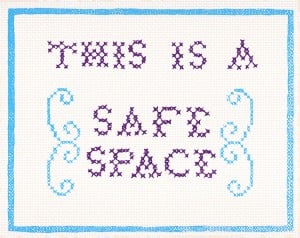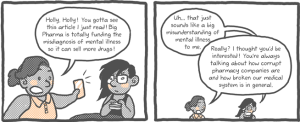
Source: Creativity, Not Control
I’m quite involved in a number of online feminist communities, most of which attempt to be safe spaces. And lately, I’ve been hearing plenty of criticisms of these spaces.
There are some useful criticisms that point out how our communities should be more inclusive, less oppressive, and more accommodating to marginalized groups. As feminism has traditionally excluded many marginalized groups of people, it’s important that we center on oppressed voices.
Then, there are some criticisms that are less useful.
In every single feminist safe space I’ve been, someone – usually someone who is more privileged than most people in the group – will call the space an “echo chamber” or, to use a more vulgar term, a “circlejerk.”
An echo chamber is a space where people repeat and agree with certain ideas, patting one another on the back instead of contributing new thoughts. An echo chamber is thought to be useless because nobody is learning anything new or expanding their perspectives.
But there’s a difference between an echo chamber and a safe space.
So, firstly, what is a safe space?
Safe spaces are places or communities – either online or off – where bigotry and oppressive views are not tolerated. They are controlled environments (insofar as they can be) in which people can discuss certain issues and support one another. Usually safe spaces will focus on specific issues, like sexism, racism, or transantagonism.
They commonly have rules to ensure that the participants know what is acceptable and what is unacceptable. If the participants violate these rules, they are usually warned, removed, or blocked.
Essentially, safe spaces provide a network of support and understanding. They are an oasis for some groups who are otherwise denied safety and respect by the world.
In order to keep a space safe, we need to have rules. Safe spaces don’t tolerate certain (oppressive) views, and they value safety over debate. There are things that are not up for debate and discussion.
Because of this, many people argue that these spaces are echo chambers and therefore useless to discussion and to feminism.
And I understand why people think this.
People, particularly those living in liberal, Westernized spaces, are taught that we should question everything, that debate is of paramount importance, and that freedom of expression is an inalienable right.
But in this context, this line of thinking is problematic. Safe spaces are extremely useful and are of the utmost importance to the feminist movement.
And I’ll tell you why.
1. Your Freedom of Expression Is Not at Risk
I come from South Africa. Up until recently, freedom of expression was not a right our citizens had. I know that it’s an extremely important right, and I know why it is valuable. But consider this:
Because most of the Internet is unmoderated, I have only a handful of places on the Internet where I know I can be my true self without being disrespected, silenced, or trolled. I need these spaces to remain safe for the sake of my emotional and psychological health.
You have the entire Internet to use your freedom of expression.
If you feel like you’re unsafe on the rest of the Internet, make your own safe spaces with your own rules, or lack thereof.
Respecting one space – a space you’re not forced to enter – isn’t going to result in loss of your freedom of expression.
2. Healing Is More Important Than Debate
Debate is important. But it’s also overrated.
People often assume that debate is of paramount importance to progress. And indeed, debate can encourage people to be thoughtful and to open their minds.
However, focusing on oppressed groups is also important. Creating spaces where those people can heal and connect with one another is necessary.
In absolutely every safe space I’ve occupied, I’ve seen privileged people entering the groups simply because they enjoy debate.
This becomes a problem because, for the oppressed members of the group, it’s a space for healing. For the privileged members of the group, it’s a fun intellectual exercise.
When the oppressed people speak out against being treated as debate topics, the privileged accuse them of stifling debate.
The moderators of the group have to come up with a set of rules. If the healing of the oppressed isn’t prioritized over debate, the space becomes unsafe and is dominated by privileged people.
For this reason, it’s important that safe spaces prioritize healing over debate. Discussion can be awesome, but what is the value of discussion if you’re dehumanizing oppressed people in the process?
3. Not All Ideas Are Worth Debating
The idea that all debate is progressive comes with the idea that everything should be up for debate.
For example, I’m a part of an online group of South African feminists. One of our rules is that victim-blaming is absolutely forbidden; we assume that everyone in the group knows that victim-blaming is wrong.
On a thread that discussed rape culture, a member of the group said, to paraphrase, “But hang on! The assumption that victim-blaming is wrong should be debated. Victims should take responsibility for their actions.” He then proceeded to make a common, unoriginal argument to justify victim-blaming.
This was problematic on two counts. Firstly, it triggered the rape survivors and victims in the group. Secondly, the commenter assumed that we were closed-minded because we didn’t want to hear his argument – as if we had never been exposed to this debate before.
As a rape victim, I am constantly exposed to the notion that I deserve to be blamed for my trauma. I know those debates better than anyone else. I’ve been forced to have those debates a thousand times over, and I’m too tired to have it again — especially in my safe space.
The assumption my safe space makes – that I should not be blamed for my rape – is already challenged constantly by most of society.
A safe space is an opportunity to connect with other people who recognize that society’s mainstream, oppressive messages are bullshit.
4. When Online Spaces Are Exclusionary, It’s Usually for Good Reason
Sometimes, online spaces are exclusively for people of a certain oppressed group.
Some spaces are for women only. Some spaces are exclusively for queer people. Some are for people of color.
Most of the time, these spaces are for people within oppressed groups to connect and share their experiences and perspectives. They are for healing, networking, and developing a community.
These spaces are extremely important because the world caters to privileged people at the expense of the oppressed. It is therefore revolutionary to have a space that focuses entirely on an oppressed group.
5. Online Safe Spaces Ensure a Diversity of Perspectives
An argument against safe spaces is that they don’t encourage a diversity of perspectives. Because certain comments are not allowed, it’s argued, you’ll only receive one viewpoint.
I argue that the opposite is true.
Making a space safe for oppressed groups of people means that they’re more likely to feel comfortable enough to contribute to the discussion.
Think about it: If a space isn’t safe from transantagonism, it’s unlikely that trans* people will share their perspective. If a space isn’t safe from racism, it is unlikely that anyone who isn’t white will contribute to the discussion. In unsafe spaces, privileged voices are more likely to dominate the discussion.
Safe spaces mean that certain voices – marginalized, often underrepresented voices – get a chance to speak without fear of hostility.
Futhermore, the notion that agreement creates an echo chamber is downright false.
Sometimes, advanced feminist spaces like Guerrilla Feminism or Shakesville have very specific comment guidelines. These guidelines require agreement on certain issues. For example, Guerrilla Feminism does not allow pro-choice versus anti-choice debates, the assertion that reverse racism is a thing, or victim-blaming of any kind.
They also don’t do feminism 101 education on demand. They expect their members to understand basic feminist theory and the concept of intersectionality.
When I explained Guerrilla Feminism’s comment policy to an acquaintance, they immediately said, “But that just means everyone will agree with one another! Nobody will learn anything.”
Just because people agree on basic issues doesn’t mean that they’ll agree on everything else. Agreeing on those basic issues means that we can have advanced discussions without getting caught up in debates we are tired of having.
Additionally, these spaces can be very educational. Saying that advanced feminist spaces aren’t educational because they don’t do basic debates or 101 education is like saying that a third-year college course isn’t educational because they don’t give lessons for first-year students.
Agreeing on a few basic tenets does not make a space an echo chamber. And, anyway…
6. Echo Chambers Can Be Useful
The biggest echo chambers I’ve ever been in were outside of safe spaces.
We all live in an echo chamber: It’s called the kyriarchy.
The media, the educational system, religious institutions, the judicial system, and other institutions all form part of one huge echo chamber that maintains the oppressive status quo. What is an echo chamber if not an interdependent network of entities that repeat and perpetuate one another’s ideas?
To the oppressed, the echoes keep on repeating that we are not human.
With this in mind, ask yourself: What’s wrong with being in an echo chamber if all that is being echoed is the idea that you are human and worthy of respect?
In a world that tries to deny the oppressed their humanity, there is nothing dogmatic about a safe space. On the contrary, safe spaces are fucking revolutionary.
***
I see the current feminist movement – and social justice activism of all kinds – as people-focused activism. More specifically, it centers on the healing of those who are hurt by the kyriarchy.
For this reason, safe spaces are extremely important. Dismissing them as echo chambers doesn’t do the movement any favors.
[do_widget id=”text-101″]
Sian Ferguson is a Contributing Writer at Everyday Feminism. She is a South African feminist currently studying toward a Bachelors of Social Science degree majoring in English Language and Literature and Gender Studies at the University of Cape Town. She has been featured as a guest writer on websites such as Women24 and Foxy Box, while also writing for her personal blog. In her spare time, she tweets excessively @sianfergs, reads about current affairs, and spends time with her gorgeous group of friends. Read her articles here.
Author’s Note: Special thanks to my community of Guerrilla Feminists and South African Feminists for contributing to my understanding of safe spaces.
Search our 3000+ articles!
Read our articles about:
Our online racial justice training
Used by hundreds of universities, non-profits, and businesses.
Click to learn more




















